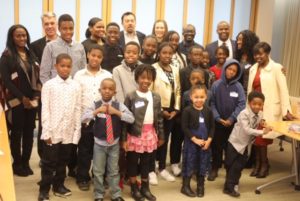The sky on this particular day was blue, clear and beautiful. The weather was the kind that invited you to be outdoors with your loved ones, friends or simply take your children out for a game. Considering such opportunities are rare as there were a series of snow, rain and stormy weathers which sandwiched that day. This is Colorado for you; but this did not deter about 30 committed and determined parents and about 20 children to gather in an enclosed house to discuss decisions that go into school choice for their children, nieces and nephews.
Papa Dia, the founder and Executive Director of the African Leadership Group (ALG) in partnership with RootEd, were the brainchild behind this discussion.
Recently, A+ Colorado, a reputable nonprofit organization, whose mission is to harness the power of Colorado’s civic community to build public will and advocate for the reforms necessary to dramatically increase student achievement in public education, recognized 3 key people – the Governor of Colorado, Jared Polis, Christine DeLeon, Founder and CEO, Moonshot edVentures and ALG’s very own Papa Dia. They dubbed the event “Sharpening Education Celebration”. The 2020 recipients were recognized for their leadership in making bold moves to improve public education throughout the state of Colorado in their respective fields. Papa’s focus on helping immigrant parents in finding the right school choice and mentoring their children to attain the highest level of education in society is a huge achievement – congratulations Papa!

Papa has made quite an impact in the lives of many, and when he called for this meeting, I felt compelled to say yes. I am heavily involved in educational affairs, serving on many educational boards both locally and out of state. Just like me, there are others who are as equally passionate about education and want to add value to the society they live in. And so, this call overrides any other commitment, regardless of the nice tempting weather out there beckoning us to be outside having fun.
The informal meeting began with networking, interaction and getting to know each other – for those who were meeting for the first time and those who were reconnecting. The room was also filled with African dishes, Ethiopian coffee and many more treats/appetizers. The atmosphere was conducive to conversation and reflection on education; and was welcoming, as though, we were one family – in fact, we are!
There were different nationals from Senegal, Mali, Kenya, Ghana, Mexico, Tanzania, Guinea, Benin, Cameroon and the African American community at the meeting. Also, professionals from diverse backgrounds and walks of life ranging from educators, consultants, instructors, event planners, insurance brokers, bankers and top executives in their respective organizations were in the room, with unique experiences and perspectives to shape the conversation. Ousman Ba, the education chair for ALG emceed the event, stating that, policies are being made on their/our behalf, but we are not at the decision table. He reiterated that the main agenda of the meeting was to discuss ideas and find ways to engage in decision making to provide a way forward.
Dr. Anne Keke and Dr. Alphonse Nembot facilitated the discussion time. They broke the ice by stating they wanted to move from the ‘menu’ to the ‘table’ this time – echoing the usual saying of Papa, that, if you’re not on the table, you’re on the menu, and the need to reverse such.
In coordinating the discussion to get accurate data, 3 debate topics were the main focus;
- How do the parents feel their kids are treated in schools
- Comparing education here to their native countries – and how engaged are they are as parents/guardians
- What information do they rely on to make school choice decisions/or wish to have to make such decisions
Also, translation was provided for some parents who could not speak or articulate themselves in the English language properly – that way, everyone’s voice was heard, and no one was left behind, which sometimes becomes a bottleneck for them.
During the first debate on how their kids are treated in schools; it became very emotional. In some schools, because of the background of the kids, (probably how they look, talk and where they come from), they are treated with disrespect. Issues with bullying occurs most of the time, including verbal and physical abuse, that affects the psychological development in some of the kids – because they turn to believe they are not good enough, which isn’t the case. These parents echoed concerns that, instead of the school spending more time to help such kids transform (because they describe them as the “problem child”), they would rather spend all of their energy, and use their resources at their disposal on disciplinary actions – they see it as misplacement of resources.
The above concerns, however, only pertain to certain schools and some teachers but a few heroic minorities (teachers and principals) who fight for the good of all students who are exceptional and exempted. They need to be separated from the pack, encouraged and elevated for what they do despite the silent opposition they face from their colleagues and the system.
Some of the parents who were present complained about nonexistence (its lack) of bilingual schools in many districts, as such, making it difficult for them to help their kids learn other languages. It is believed that, having options could help their kids attain the highest level and be able to articulate themselves in addition to the English language, and be more productive when they grow.
On the second debate question; how well the parents are engaged in their kid’s school life; it was almost unanimous how committed and involved they were. Helping them with homework, attending school meetings/performances and being part of their everyday life as much as they could. However, in a rather sad story, a passionate parent narrated how quickly homework is completed and the child seemed to be bored and has nothing to do afterwards. When she traced her child’s boredom to the school, the school chose the path of “problem child” – however, it is mainly due to inactivity. Sometimes, the same thing is taught over and over again with less challenge – leading to the issue of boredom and a lack of engagement within the classroom.
On the final debate question; regarding the type of information they need/rely on to make school decisions or information they wish to have to enable them to make such decisions; it was a mixture of information. While some rely on public information to make such decisions, a few said the school (principal from existing school) decides for them. This is the case of a student moving from one school to another after graduating. However, data collected from the majority of other parents were based on their personal choice to change school or enter a new one for the first time. In that case, some said they made their choices based on additional language opportunity (if any) the school had, while some looked at the school’s reputation, racial/ethnicity ratio spread and academic performance to decide. Many others indicated they had no choice and that the district dictates the exact school choice for them based on their zip code. As if not enough, just when it was almost time to close, a few came out with additional information indicating the volatility of school’s curriculum as a determining factor for their choice. Also, while a few want their kids to be mixed with other immigrant kids, others want full immersion but want to be treated fairly and not as second-class citizens.
The weather was still at its peak when the meeting ended and on time. The honorable facilitators and the emcee concluded with some suggestions; asking the parents to continue to be engaged. ALG will be there to provide necessary support and guidance, however, parents need to make their grievance known immediately to allow their voices to be heard in the community in a positive manner. It was said, knowledge is power but applied knowledge is power.

The question therefore is, how best are immigrant parents and their children and people of color treated in schools? Either by teachers or parents of other children in the school…!?!
—
Written by Guest Blogger: Evans Kwesi Mensah. Evans is a bestselling author of Synergy and Commonality: The Key to Success; Consultant and education researcher; Board member of Omar D. Blair K-8 School, Denver and Howard University Executive Program, Washington DC.
[…] Evans Kwesi Mensah, an African Leadership Group partner, and bestselling author, shares what it’s like navigating school choice for Colorado immigrant families. Read his piece here. […]